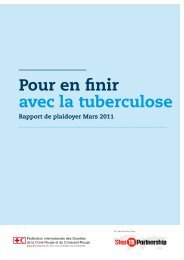Thailand - Stop TB Partnership
Thailand - Stop TB Partnership
Thailand - Stop TB Partnership
You also want an ePaper? Increase the reach of your titles
YUMPU automatically turns print PDFs into web optimized ePapers that Google loves.
Government Program for<br />
<strong>TB</strong> and <strong>TB</strong>/HIV Control<br />
Program content<br />
The NTP was established in 1966. DOTS was adopted as the NTP’s core policy in 1996, and<br />
identified as a priority of the national health policy in 1997. By 2002, the NTP reported that<br />
100 percent of the population had access to DOTS services. According to the most recent<br />
government figures, the NTP detected 71 percent of the estimated total number of <strong>TB</strong> cases,<br />
surpassing the 70 percent global case detection target. Of these, 73 percent were treated<br />
successfully, still short of the 85 percent global treatment target. 53<br />
In 2001, the NTP issued a revised set of operating principles, articulating a transformation<br />
in the role and function of regional, provincial, and district personnel, and a<br />
new process for assessment of outcomes at each level. The revised policy prioritizes the<br />
following elements:<br />
• Decentralization of treatment service: Local health centers have responsibility for<br />
distribution of <strong>TB</strong> drugs in rural areas.<br />
• Community involvement: Village health volunteers or family members can provide<br />
directly observed treatment (DOT), with training and support from local authorities.<br />
• Quality assurance: District <strong>TB</strong> coordinators (DTCs) ensure appropriate training for<br />
health center staff, village health volunteers, and family members.<br />
• Diagnostics: Prioritization of the need for improved diagnostic services (reflecting<br />
growing concern about MDR-<strong>TB</strong>).<br />
• Drug administration: Ensuring free <strong>TB</strong> diagnostic services (sputum examinations<br />
and x-rays) to those who can not afford to pay (others pay a minimum charge for<br />
these services) and free <strong>TB</strong> drugs for all.<br />
<strong>TB</strong> and poverty reduction<br />
The government has taken a number of steps to bolster its poverty reduction policies and<br />
activities, 54 including the designation of poverty alleviation as a priority area by the National<br />
Economic and Social Development Board. However, while maternal and child health, infant<br />
46<br />
<strong>TB</strong> POLICY IN THAILAND



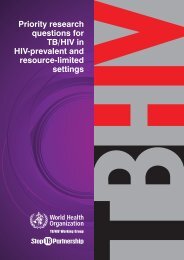
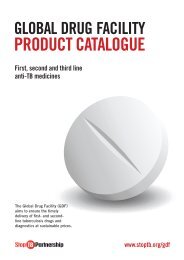
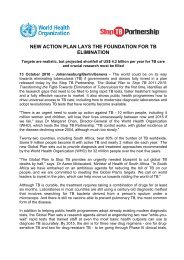
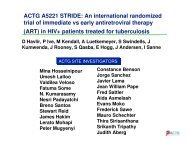
![Global Drug Facility Annual Report 2011 [.pdf] - Stop TB Partnership](https://img.yumpu.com/26788745/1/184x260/global-drug-facility-annual-report-2011-pdf-stop-tb-partnership.jpg?quality=85)

![Concept note on national stop TB partnership [.pdf]](https://img.yumpu.com/26788741/1/184x260/concept-note-on-national-stop-tb-partnership-pdf.jpg?quality=85)
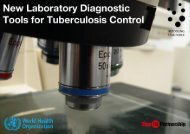
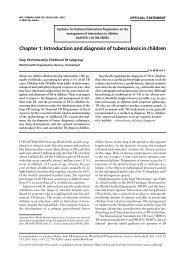
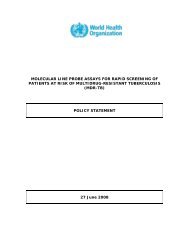
![2005 and Challenges for 2006 - 2015 [.pdf] - Stop TB Partnership](https://img.yumpu.com/26788674/1/190x245/2005-and-challenges-for-2006-2015-pdf-stop-tb-partnership.jpg?quality=85)
![Brochure (French) [.pdf] - Stop TB Partnership](https://img.yumpu.com/17234792/1/190x91/brochure-french-pdf-stop-tb-partnership.jpg?quality=85)

